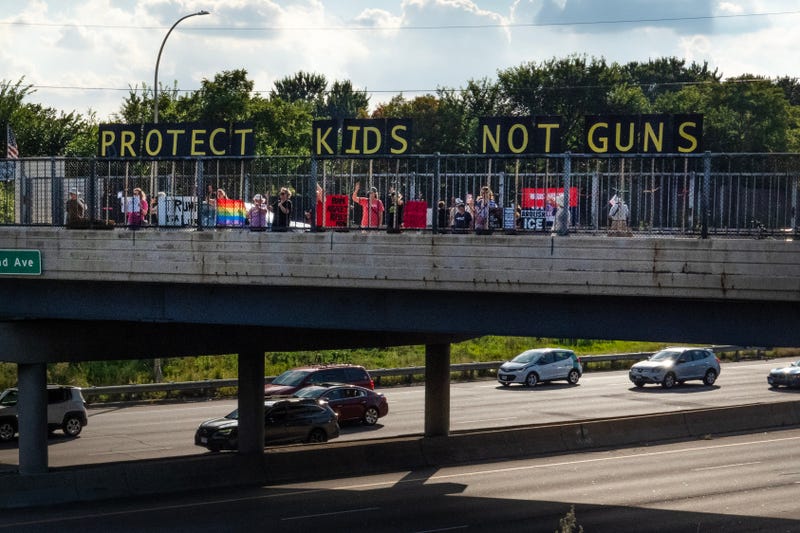Minnesota Governor Tim Walz plans to call a special legislative session to consider tougher gun laws following a shooting last week at a Catholic school in Minneapolis that left two children dead and 21 people injured.
Walz, while visiting students on the first day of school, said he planned to reach out to Republicans on Tuesday to begin to talk about his plan.
One of those key Republicans is Minnesota House Speaker Lisa Demuth (Cold Spring) who says Wednesday morning that she has talked with Walz about a special session to address gun control.
Demuth tells the WCCO Morning News with Vineeta Sawkar any special session must focus on more than gun control, including stiffer penalties for those convicted of multiple gun offenses.
"We would like to look at mandatory minimum sentences for something like that," says Demuth. "And then overall, the conversation and the need for additional mental health services, those are really topline things that have to be part of the conversation that will be in those committee hearings."
No official timeline for a special session has been given to bring lawmakers back to St. Paul.
"He said he wanted to put together a gun package and that it was probably going to be very uncomfortable for us to vote on it," Demuth explained. "I did remind him with the makeup of the legislature and the work that we did last year, everything that we passed was bipartisan, and that's how I would be looking at the special session also."
Any Special Session will be tricky
That bipartisan support will be tricky. WCCO Political Analyst Blois Olson says at this point, it's hard to predict what any outcome would be.
"Well, the governor said he's going to put forth a package of proposals," Olson said. "I think we have to see what's in that package. I talked to senators of the governor's own party yesterday, and they're waiting to see too."
Olson says it gets even trickier for Walz and supporters of stronger gun laws because they don't necessarily have full DFL support.
"There had not been a lot of legislative outreach either to Republicans or to Democrats, especially Democrats who have not supported these kinds of provisions before," he adds. "So, we have to see what's in that package."
Olson also thinks there is a political play here, with Democrats attempting to get Republicans on record.
"But one of the challenges is that they don't control the floor agenda in the House," Olson said. "So the idea that they would even get a vote in the House."

For the most part, Minnesota governors have not been willing to call special sessions in without a pre-arranged agreement.
"If there's not a pre-agreed to agenda, then the governor can't adjourn the legislature," Olson explains. "So legislators could either sign in and sign out, or they could linger and take up many other issues for votes. This is a little more complicated special session than traditionally."
Timing is also going to be a key piece of this. There are still a couple of special elections coming up that will determine control of both the House and Senate. The House has one seat open, the late former Speaker Melissa Hortman, also a victim of gun violence. That is coming up Sept. 16 and will likely stay in DFL hands keeping the House tied.
"I'm guessing he's going to time it for when the legislature has a full legislature, because they're down one seat in the House," Olson explains. "That special election will be soon, and then they're down two seats in the Senate."
Those two Senate seats won't be determined until the general election on November 4. One is for the late Sen. Bruce Anderson, the other for former Sen. Nicole Mitchell who resigned after being found guilty of burglary. Anderson's former seat is a strong GOP district while Mitchell's is likely going to stay with the DFL, keeping Democrats in the majority in the Senate by one seat.
Olson does say issues like gun rights are strong enough to turn an election.
"I go back to the poll numbers, just because that's popular, doesn't mean legislators are willing to do it," he says.
City Mayors and Gun Owners Caucus make their views known too
On Tuesday, several city mayors, including from Minneapolis and St. Paul, called for lawmakers at both the state and federal level to address gun reform, or give the cities the right to do it themselves.
"Cities have a long history of leading, stepping up when higher levels of government have stalled," said Bloomington Mayor Tim Busse. "Whether it's housing, indoor smoking bans, earned sick and safe leave, childcare, it was cities that led and eventually - eventually the state followed."
The Minnesota Gun Owners Caucus has already been vocal in saying assault weapons bans don't reduce gun crimes.
“Instead of treating this as a political football in an election year, we should pursue steps that research shows are effective: strengthening mental health resources, broadening community support systems, providing schools with discreet layered security, and denying perpetrators the notoriety they seek,” Rob Doar of the Gun Owners Caucus said. “These solutions would have real impact and can earn broad bipartisan, even unanimous, support.”
